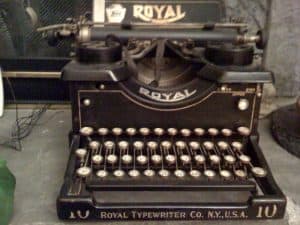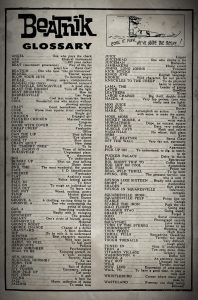
Friday, 2:33pm
Reno, NV
“The difference between the right word and the almost right word is the difference between lightning and a lightning bug.” (Mark Twain)
Howdy…
There are two things that distinguish top copywriters from the rest of the hoi palloi —
1. A deep, reverential knowledge of street-wise salesmanship… and…
2. A love affair with the English language.
I talk endlessly (endlessly!) about the salesmanship stuff, because that’s the thing most rookies lack. And I get a huge thrill when it finally sinks in, and one of my students rips out a truly killer ad that gets even my jaded greed glands quivering.
However, force-feeding a love of language into someone is a much harder gig. At least here in the States. My burgeoning British and Irish subscribers — only recently hip to hard-hitting, direct response style advertising — seem to have an advantage here.
Europeans look at language differently than Yanks, probably because every fifty miles or so everyone is speaking a completely foreign tongue.
Language is identity. Across the pond, it matters how you form your vocal outbursts, and large vocabularies impress.
Back here on the farm, most local dialects of English have degenerated over the generations. Americans have pathetically tiny vocabularies (though most understand more words than they routinely use when speaking).
Language gets a bum rap here.
Which is great, if you’re a serious writer.
Because words carry power… and learning how to use words to convey ideas makes you a powerful individual.
First, the Thesaurus.
Then, the world!
Actually, I’m only half-kidding with that. I just had an Insider ask me for a better way to find better words to use.
And here is what I told him: Write out your headline and copy without paying any attention to how weak your word choices may be. Just get the pitch laid out, so you have an actual sales message.
Then, the fun begins.
Top writers have a Thesaurus in their head... but only after years of actually using a physical one. We've just memorized a bunch of different word choices, through the act of beefing up our writing over and over again.
Rookies need to get an excellent Thesaurus -- an actual book, not Gates's lousy Word version -- and start the process of dog-earing the pages.
(You want a real book, because using computer versions takes away both the tactile experience of searching for words... and eliminates the "happy accidents" of coming across a completely different word in your search, which you may use now or store for later in your head.)
I call it "Creating Power Word Charts".
Most rookies choose common verbs as they write. That's fine. During editing, though, whip out the Thesaurus and see what other choices are available for that dull, over-worked word.
Write them down on a piece of paper.
Then, look up each of those words, and see what other connotations exist. And write some of the best of those words down.
What you will have is a page full of choices, all connected like a geneology chart back to the initial word.
For example, let's say you used the word "run" in your copy. On page 693 of my trusty, beat-to-shit Webster's Collegiate Thesaurus, the synonyms for "run" take half a column.
Let's see... dash, scamper, scoot, scurry, sprint... and a suggestion to check out scuttle. Related words listed: race, bustle, hurry, rush, speed, scorch.
Lots more: Trot, chase, herd. Idiom suggestions (great for seeing how to see the concept of "to run" might be changed): Hot foot it, make a break, run for it, take flight, take to your heels.
Just a sampling, kids.
Now, for the fun of it... because as we all know, writers have soooo much time on our hands... let's go check out "bustle" on page 112: It's an old word, not often used today. But the synonyms open up some bitchin' new possibilities: Whirl, whisk, flurry, fuss, commotion.
I like commotion. Also fuss.
So go check out those words, too.
All this work...
... just to find ONE "right" word?
You bet. It may seem like a hassle, but it's just detective research on the "language vehicle" that will carry your pitch.
The "right" word in your headline can transform the level of interest you create in your reader.
However, don't make the rookie mistake of going overboard with this. Most of the "vanilla" verbs and other words you use are just fine in your copy. You're not trying to challenge the reader, by leveling odd and trippy word choices at him with every verb.
No way. It's the critical verbs and phrases that you need to tend to -- the parts of your pitch that suck your reader in, and hold him tight while you shovel your sales message into his amydala.
Probably, you don't need to change the word "run" in your copy.
Still, I like the idea of saying "So I bustled over to the counter to place my order before the crowd realized what was happening."
It adds flavor to the "voice" in your copy. I mean... what kind of guy would use a word like bustle? In the right sense, it actually conveys confidence and a little self-depricating humor... always a good trait in a salesman.
The English language is the most adaptable and useful language in the world. It's just that we don't make full use of it... which is a shame for the communicative powers of your average Joe, but a criminal act for a writer.
Words are easy to fall in love with. They have the power to seduce, entrance and slay.
Get hip.
And stay frosty,
John Carlton
P.S. Happy accident on page 113, while looking up "bustle": the word "buttinsky" -- to butt in, a kibbitzer, meddler or pragmatist. (Pragmatist?)
Also the word "butcher". I'm gonna use that one tonight, in a piece.
P.P.S. Were you thrown by the word "Thesaurus"? Look it up in your dictionary first.
Then high tail it over to the local book store and BUY ONE.
Do it.
Fall in love.




